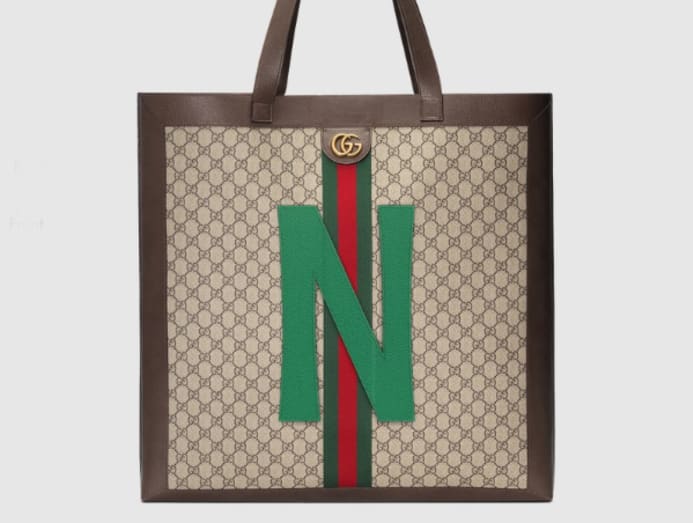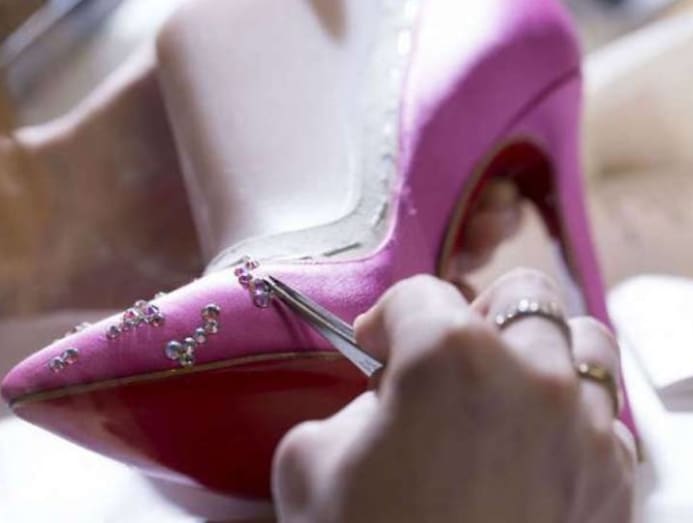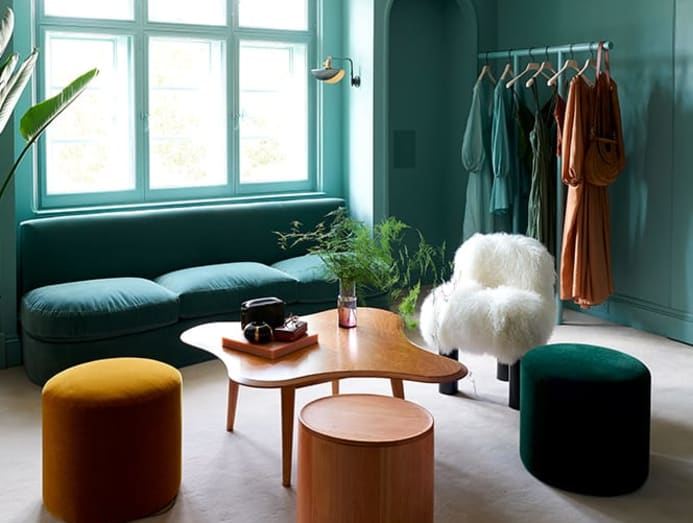Why brands from Burberry to Gucci are increasingly offering personalisation
Tucked abroad off a quaint courtyard most the Louvre in Paris, designer Christian Louboutin and his team work in a surreptitious atelier on their about special made-to-mensurate requests. This might exist a drove of shoes for burlesque dancer Dita Von Teese's latest revue, bridal pumps to match the fabric of the nuptials apparel, or even like one recent committee, a 100 per cent vegan shoe.
"Bespoke styles take always been something important to me," Louboutin told the Financial Times. "It's a way for me to keep an intimate connection with my clients and to have direct feedback on how they perceive my work." Last year, the designer said, bespoke requests rose by a fifth.

From Gucci's "DIY" service, through which customers can personalise knitwear, tote bags and its Ace sneakers with letters in different colours and materials, to Burberry Bespoke which allows customers to choose the way, material, color and hardware of their trenchcoat, brands are increasingly offering personalisation and customisation.
Consumers are enervating it as they seek means to stand out from the oversupply in a earth where brands are in danger of becoming overexposed through social media and the mass consumption of luxury.
"The return to some degree of production personalisation in luxury is an astute way for brands to offering additional customisation services to a more discerning clientele while standing to abound overall volumes, particularly in entry-level categories," said Thomas Chauvet, an analyst at Citi.
READ> Keeping the spirit of 1 of Hong Kong's nigh famous bespoke tailors alive
About 1 in v luxury buyers said that customisation, notably made-to-measure, is relevant to them when they buy luxury products, according to a report last month by the Boston Consulting Group and Altagamma, Italy's luxury association.
According to the report, the €330 billion (S$506 billion) personal luxury market place grew five per cent last year and is expected to reach €405 billion by 2025. Information technology said that younger generations are more willing to expect or pay extra for personalised products.

Chauvet said that personalised products typically have a higher margin, "and nosotros expect this segment to grow faster than the overall luxury market, albeit on a relatively limited sales base".
Le Bon Marche, the LVMH-owned section store in Paris, is devoting more and more space to personalisation, "a crucial and growing area for us," according to Patrice Wagner, its chairman and chief executive.
"In that location are simply so many people with whom an individual stylist tin can collaborate. The bridge between what humans tin can offering and clients are demanding is data." – Ganesh Srivats, Moda Operandi
Customers can personalise products from more than 80 international brands, buying or bringing in clothes or shoes to be jazzed upwardly with stones, studs and sequins, or designing a T-shirt on screen. "Customers want something original and different," said Wagner. "I don't think it's a passing phenomenon, it's a tendency that has substance. The consumer is becoming the designer."
Managing the personalisation process can be a challenge, however. Olivier Salomon, a managing manager at consulting firm AlixPartners said brands "demand to understand this in the overall context of making and delivering the products, while making sure that it doesn't cannibalise their existing business organisation".
Production personalisation is going hand in hand with personalisation of both a customer'southward individual experience and their relationship with the brand. "Today with digital and information analytics, brands have the opportunity to have a personalised relationship with everyone, not just their VIP clients and biggest buyers," said Olivier Abtan, a partner at BCG.
READ> The Japanese bespoke shoemaker who doesn't want his creations to stand out
Francois-Henri Pinault, chairman and main executive officer of Kering, said at the group's annual coming together last calendar month, that "we must customise the dialogue with our clients" and said that the group is expanding its use of artificial intelligence. Like other brands, Kering is increasingly using AI to personalise the customer experience and optimise targeted marketing.
Luxury east-commerce platforms like Yoox Net-a-Porter, Moda Operandi and Matchesfashion.com use tools including data analytics and AI-enabled personal stylists to make recommendations for customers based on their stated preferences, browsing and buying history, likewise equally based on what other people with a similar contour bought.
"Personalisation is extremely important in this business concern, just like with Netflix or Spotify," said Ganesh Srivats, main executive officeholder of Moda Operandi. "There are only so many people with whom an individual stylist can interact. The bridge between what humans can offer and clients are demanding is data."
Srivats added, however, that technology-driven recommendations tin can be "a double-edged sword" because "taken to its logical conclusion consumers would but see replicas of everything they had already liked or bought. The question is how do you add to the sense of the familiar while continually challenging the consumer."

As then-called experiential luxury drives a new era for the industry, the boundaries of bespoke are expanding.
"Personalisation should exist nearly a lifestyle, agreement that information technology's not simply about fashion just anything that has a value to your life: Art, cinema, food, literature," said Ulric Jerome, main executive of Matchesfashion. Last year the group opened a Mayfair townhouse at v Carlos Place, an experiential retail and event concept that intends to connect online shopping, social media, and one-time-fashioned bricks and mortar.
This calendar month Matchesfashion is launching a collaboration with Pellicano Hotels in Italy, in which a 1930s yacht will tour the Mediterranean featuring a 5 Carlos Place popular-up. The prowl will be projected across all the group's platforms via live streams, podcasts and social channels.
"People desire to travel with us and be inspired by united states of america," said Jerome. "They desire to be office of the gamble. That's what we consider to be total personalisation."
By Harriet Agnew © 2022 The Financial Times
READ> What the future of retail looks like for Ion Orchard, according to its CEO
Source: https://cnalifestyle.channelnewsasia.com/obsessions/why-luxury-brands-are-increasingly-offering-personalisation-239696
0 Response to "Why brands from Burberry to Gucci are increasingly offering personalisation"
Post a Comment